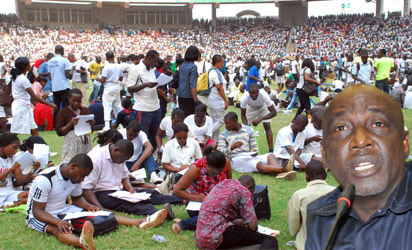PDP senators obviously sought to mock the ruling APC on Wednesday by seeking a resolution urging the government to pay each unemployed Nigerian N5, 000 per month. They ended up making a mockery of the entire Senate. Everyone knows it’s senseless – and impossible – to pay such a stipend in times of economic recession such as these.
Strangely, minister-designate and APC national publicity secretary Lai Mohammed still assures that his party would fulfil its campaign promise “to pay N5, 000 each to 25million vulnerable Nigerians”. Can this government afford to dole out extra N125billion every month? Add administrative charges, consultancy fees and bank charges and you have not less than N200billion.
Election campaign promises are almost always not kept. So I would recommend that the APC begin to face reality – and tell us so. It’s desirable to have a social security scheme that would take care of the weak and defenceless poor, but Nigeria has not put in place adequate structures for its implementation. On occasion I’m tempted to regard all Nigerian civil servants as beneficiaries of a social security scheme. The reason? They are unproductive. I reached that conclusion over a quarter-century ago, during my NYSC. At the Federal Ministry of Information where I did my primary assignment, I could complete in two hours what I was required to do in a whole month. And I remembered the tale told by an uncle who gave up teaching around 1946 because he was asked to tell moonlight tales to young pupils then. “Is this what I should do in my youth?” he queried. “When I get old, what would I be doing?” The next weekend, he abandoned the school and went into farming at a town with fertile soil 94km away. He prospered more than his colleagues who remained in the teaching profession until their retirement in 1980.
Any attempt to implement the N5,000-for-25million programme is sure to fail. We should worry over the failure of SURE-P and NAPEP to address crippling poverty in Nigeria, but we should worry more over the failure of NERFUND, Bank of Industry, SMEDAN, People’s Bank, DFRRI, cooperatives and microfinance banks. The ideas that inspired their formations are much better than the idea of sharing money among the vulnerable. Is it not said that it’s better to teach one how to fish than to give them fish? Give a man fish and you feed him for one day; teach him how to fish and you feed him for a lifetime.
I’m aware there are Nigerians who would start a “business” with as little as N2, 000. But how many of them would be able to walk out of the poverty hole? A woman who hawks sachet water or roasts corn in the street may not need as much as N5, 000 to start. A young man who sells kolanuts, sweets, biscuits, bread and other articles in a makeshift kiosk probably needs just N5, 000. Some of them could get by, but none of them could pay school fees or rent a decent accommodation.
Many jobless graduates have become vulnerable too, but I don’t think any of them could start a “business” with just N5, 000 unless they are forced to. I therefore recommend a programme that would “force” them to embrace agriculture.
Who told the APC that there are only 25million vulnerable Nigerians? My guess is that no fewer than 100million would register for the dough today. There is no criterion for selecting vulnerable Nigerians that would bring the figure down to 25million. So what would the government do with 75million others?
The plan
To have any chance of succeeding in this enterprise, government would do well to do it in phases. Each set of beneficiaries should give way, after one year, for another set. It would cost government N1.5trillion a year to pay each of 25million people N5, 000 per month. Let’s begin with the first set, since we’ve been assured that N1.5trillion is waiting somewhere.
From the outset, it should be made clear that the programme would jump-start an agricultural revolution. Therefore, only those interested in crop production (pepper, garden egg, tomato, ginger, water melon, onion, millet, maize, corn, rice, etc.) or animal husbandry (fish, rabbit, chicken, pig, goat, etc.) or horticulture need apply. Each must own a registered phone line and have a valid bank account. They must not make withdrawals for the first six months, after which they would clear farmlands or erect houses for their animals. To qualify for the next payments, each must have documented evidence of readiness to plant crops or buy their first animals. Then, three or four months’ stipends would be paid direct to suppliers of seeds and seedlings, young animals and animal feed. The last two months’ pay would reach only verified claimants.
At the end of one year, another set of 25million could be invited to benefit from the programme. By then, members of the first set would be able to stand on their own and even employ more hands.
–By ANIEBO NWAMU
#











